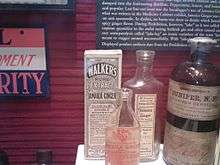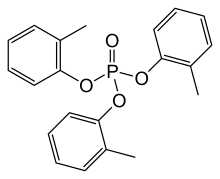Jamaica ginger


_(8225510422).jpg)
Jamaica ginger extract, known in the United States by the slang name "Jake," was a late 19th-century patent medicine that provided a convenient way to bypass Prohibition laws, since it contained between 70% and 80% ethanol by weight.
History
"Jake" was not itself dangerous, but the U.S. Treasury Department, which administered the Prohibition laws, recognized its potential as an illicit alcohol source, and because of this, it required changes in the solids content of Jake to discourage drinking. The minimum requirement of ginger solids per cubic centimeter of alcohol resulted in a fluid that was extremely bitter and difficult to drink. Occasionally, Department of Agriculture inspectors would test shipments of Jake by boiling the solution and weighing the remaining solid residue. In an effort to trick regulators, bootleggers replaced the ginger solids with a small amount of ginger and either castor oil or molasses.
A pair of amateur chemists and bootleggers, Harry Gross and Max Reisman, worked to develop an alternative adulterant that would pass the tests, but still be somewhat palatable. They sought advice from a professor at MIT who did not realize it was meant for internal consumption. They settled on a plasticizer, tri-o-tolyl phosphate (also known as tri-ortho cresyl phosphate, TOCP, or Tricresyl phosphate), that was able to pass the Treasury Department's tests but preserved Jake's drinkability. TOCP was originally thought to be non-toxic; however, it was later determined to be a neurotoxin that causes axonal damage to the nerve cells in the nervous system of human beings, especially those located in the spinal cord. The resulting type of paralysis is now referred to as organophosphate-induced delayed neuropathy, or OPIDN.
In 1930, large numbers of Jake users began to lose the use of their hands and feet. Some victims could walk, but they had no control over the muscles which would normally have enabled them to point their toes upward. Therefore, they would raise their feet high with the toes flopping downward, which would touch the pavement first followed by their heels. The toe first, heel second pattern made a distinctive “tap-click, tap-click" sound as they walked. This very peculiar gait became known as the jake walk and those afflicted were said to have jake leg, jake foot, or jake paralysis. Additionally, the calves of the legs would soften and hang down and the muscles between the thumbs and fingers would atrophy.
Within a few months, the TOCP-adulterated Jake was identified as the cause of the paralysis, and the contaminated Jake was recovered. But by that time, it was too late for many victims. Some did recover full, or partial, use of their limbs. But for most, the loss was permanent. The total number of victims was never accurately determined, but is frequently quoted as between 30,000 and 50,000. Many victims were immigrants to the United States, and most were poor, with little political or social influence. The victims received very little assistance, aside from being the subject of a few blues songs recorded in the early 1930s (e.g. "Jake Walk Papa" by Asa Martin, "Jake Leg Blues" by the Mississippi Sheiks, "Alcohol and Jake Blues" by Tommy Johnson and "Jake Liquor Blues" by Ishman Bracey).
Although this incident became well known, later cases of organophosphate poisoning occurred in Germany, Spain, Italy, and, on a large scale, in Morocco in 1959, where cooking oil adulterated with jet engine lubricant from an American airbase led to paralysis in approximately 10,000 victims, and caused an international incident.[1]
Cultural references
Books
- In Sara Gruen's 2006 novel Water for Elephants jake paralysis afflicts one character, Camel, after drinking contaminated Jamaica Ginger.
- In the novel The Black Dahlia, the protagonist reveals early on that his mother went blind and fell to her death after drinking jake, leading to his resentment of his father for purchasing it.
- In the novel Hotel on the Corner of Bitter and Sweet the main character purchases Jamaica Ginger in order to gain access to a jazz club when he was a minor.
- In Cormac McCarthy's 1979 novel Suttree, minor character Kenneth "Worm" Hazelwood turns down a drink of homemade whiskey, saying that the last time he drank such liquor, it gave him "the jakeleg."
- In his autobiography On the Move: A Life, Oliver Sacks describes research that he conducted to develop an animal model of jake paralysis. He was able to duplicate the toxic effects of TOCP on myelinated neurons in earthworms and chickens.
Music
Songs were recorded at the time about "jake" and its effects; in a variety of musical styles, including blues and country. Several have been included on the compilation albums Jake Walk Blues (1977, 14 songs)[2] and Jake Leg Blues (1994, 16 songs)[3][4] There is a marked but unsurprising duplication of songs between those albums. In some cases, different artists used the same title for different songs. The songs on one or both of those albums are, in alphabetic order by title:
- "Alcohol and Jake Blues" – Tommy Johnson (1929, Paramount 12950) [5][6][7][8]
- "Bay Rum Blues" - David McCarn and Howard Long [9]
- "Bear Cat Papa Blues" – Gene Autry and Frankie Marvin (1931, unreleased) [10][11]
- "Beer Drinkin' Woman" - Black Ace
- "Got the Jake Leg Too" - Ray Brothers [12]
- "Jake Bottle Blues" - Lemuel Turner (1928, Victor V-40052) [13][14]
- "Jake Head Boogie" - Lightnin' Hopkins (c. 1949-1950)
- "Jake Leg Blues" - Willie ("Poor Boy") Lofton (1935, Decca 7076) [15]
- "Jake Leg Blues" - Mississippi Sheiks with Bo Carter (1930, Okeh 8939) [16][17][18]
- "Jake Leg Rag" - W. T. ("Willie") Narmour and S. W. ("Shell" or "Shellie") Smith [19][20]
- "Jake Leg Wobble" - The Ray Brothers [21][22]
- "Jake Legs Blues" - Maynard Britton
- "Jake Legs Blues" - Byrd Moore [23]
- "Jake Liquor Blues" - Ishmon Bracey (1929, Paramount 12941) [24][25][26]
- "Jake Walk Blues" - The Allen Brothers (1931, Victor V-40303) [27][28][29]
- "Jake Walk Blues" - Maynard Britton
- "Jake Walk Papa" - Asa Martin (1933) [30]
- "Limber Neck Rag" - W. T. Narmour and S. W. Smith
Other musical references include:
- The Three Terrors—Stephin Merritt, LD Beghtol, and Dudley Klute—performed Jake Walk Papa at their 2003 extravaganza Intoxication[31] at The Bowery Ballroom, New York.
- Savannah, Georgia-based Baroness (band) recorded a song called "Jake Leg" for its album Blue Record.
- A Nashville, Tennessee-based jug band called the Jake Leg Stompers derive their name from this.
- A Stoke-on-Trent, England based jug band called The Jake Leg Jug Band who take their name from this.
- "Gingerjake" is also the name of an American indie-rock band from Minnesota.
Screen
- Jamaica ginger ("Ginger Jake") is a plot element in two episodes of The Untouchables, an American TV series.[32]
- "Ginger Jake" also makes an appearance in the movie Quid Pro Quo, where "wannabes" (people who would like to be disabled) are helped by Ginger Jake to become disabled.
- The character Eddie, played by Walter Brennan in Howard Hawks's To Have and Have Not, is a "rummy"--an alcoholic—whom Brennan endows with a peculiar gait that may be meant to suggest jake leg.
- In the film Water for Elephants the circus roustabout character called "Camel" loses the use of his legs due to prolonged consumption of jake.
References
- ↑ Segalla, Spencer David (2012). "The 1959 Moroccan oil poisoning and US Cold War disaster diplomacy". The Journal of North African Studies. 17 (2): 315–336. doi:10.1080/13629387.2011.610118.
- ↑ Various – Jake Walk Blues, Stash Records ST 110 at Discogs
- ↑ Various – Jake Leg Blues, Jass Records J-CD-642 at Discogs
- ↑ Various Artists: Jake Leg Blues at AllMusic. Retrieved July 21, 2015.
- ↑ "Tommy Johnson discography". Retrieved July 21, 2015.
- ↑ Tommy Johnson – Alcohol And Jake Blues / Ridin' Horse at Discogs
- ↑ Tommy Johnson: Alcohol and Jake Blues at AllMusic. Retrieved July 21, 2015.
- ↑ Tommy Johnson: Alchohol [sic] And Jake Blues at AllMusic. Retrieved July 21, 2015.
- ↑ Howard Long / David McCarn: Bay Rum Blues at AllMusic. Retrieved July 21, 2015.
- ↑ George-Warren, Holly (February 5, 2009). Public Cowboy No. 1: The Life and Times of Gene Autry. USA: Oxford University Press. p. 344. ISBN 978-0195372670. Retrieved July 21, 2015.
- ↑ Gene Autry: Bear Cat Papa Blues at AllMusic. Retrieved July 21, 2015.
- ↑ The Ray Brothers: Got the Jake Leg Too at AllMusic. Retrieved July 21, 2015.
- ↑ "Lemuel Turner discography". Retrieved July 21, 2015.
- ↑ Lemuel Turner: Jake Bottle Blues at AllMusic. Retrieved JUly 21, 2015.
- ↑ "Willie 'Poor Boy' Lofton discography". Retrieved July 21, 2015.
- ↑ "Mississippi Sheiks discography". Retrieved July 21, 2015.
- ↑ Bo Carter / Mississippi Sheiks: Jake Leg Blues at AllMusic. Retrieved July 21, 2015.
- ↑ Mississippi Sheiks: Jake Leg Blues at AllMusic. Retrieved July 21, 2015.
- ↑ Narmour & Smith / William T. Narmour / Shellie W. Smith: Jake Leg Rag at AllMusic. Retrieved July 21, 2015.
- ↑ Narmour & Smith: Jake Leg Rag at AllMusic. Retrieved July 21, 2015.
- ↑ The Ray Brothers: Jake Leg Wobble at AllMusic. Retrieved July 21, 2015.
- ↑ Allen Brothers / The Allen Brothers / Ray Brothers: Jake Leg Wobble at AllMusic. Retrieved July 21, 2015.
- ↑ Byrd Moore: Jake Legs Blues at AllMusic. Retrieved July 21, 2015.
- ↑ "Ishmon Bracey discography". Retrieved July 21, 2015.
- ↑ Ishman Bracey: Jake Liquor Blues at AllMusic. Retrieved July 21, 2015.
- ↑ Ishman Bracey / Charley Taylor: Jake Liquor Blues at AllMusic. Retrieved July 21, 2015.
- ↑ Allen Brothers – Jake Walk Blues at Discogs
- ↑ Allen Brothers: Jake Walk Blues at AllMusic. Retrieved July 21, 2015.
- ↑ Allen Brothers / The Allen Brothers: Jake Walk Blues at AllMusic. Retrieved July 21, 2015.
- ↑ Jake Walk Papa at AllMusic. Retrieved July 21, 2015.
- ↑ "The Monday Set: The Three Terrors – New York City – 1/26/03". thesoundofindie.com.
- ↑ Staff Writer, "The Jamaica Ginger Story", TV.com, Date Unknown
Further reading
- Baum, Dan, "Jake Leg", The New Yorker September 15, 2003, p. 50-57. (PDF)
- Blum, Deborah. The Poisoner's Handbook: Murder and the Birth of Forensic Medicine in Jazz Age New York (Penguin Press, February 18, 2010)
- Burns, Eric. The Spirits of America: A Social History of Alcohol (Philadelphia: Temple University Press, 2003) pp. 221–223
- Kidd, J. G, and Langworthy, O. R. Jake paralysis. Paralysis following the ingestion of Jamaica ginger extract adulterated with triortho-chesyl phosphate. Bulletin of the Johns Hopkins Hospital, 1933, 52, 39.
- Gussow, Leon MD. The Jake Walk and Limber Trouble: A Toxicology Epidemic. Emergency Medicine News"". 26(10):48, October 2004.
- Morgan, John P. and Tulloss, Thomas C. The Jake Walk Blues: A toxicological tragedy mirrored in popular music. JEMF (John Edward s Memorial Foundation) Quarterly, 1977, 122-126.
- Sara Gruen, (2006). Water for Elephants : A Novel. Chapel Hill, NC: Algonquin Books. ISBN 1-56512-499-5.
- U.S. Congress, Office of Technology Assessment, Neurotoxicity: Identifying and Controlling Poisons of the Nervous System, OTA-BA-436 (Washington, DC: U.S. Government Printing Office, April 1990).
- Kearney, Paul W. Our Food and Drug G-Men The Progressive July 10, 1944
External links
- The Epidemiologic Side of Toxicology (slides 6 - 10 deal with the Jamaica Ginger Epidemic)
- Songs about jake leg.
- The Jake Leg Infamy. This film was originally shown September 2009, at the North American College of Clinical Toxicology meeting in San Antonio, TX. It was part of the Toxicology Historical Society component. It has a Standard YouTube License.